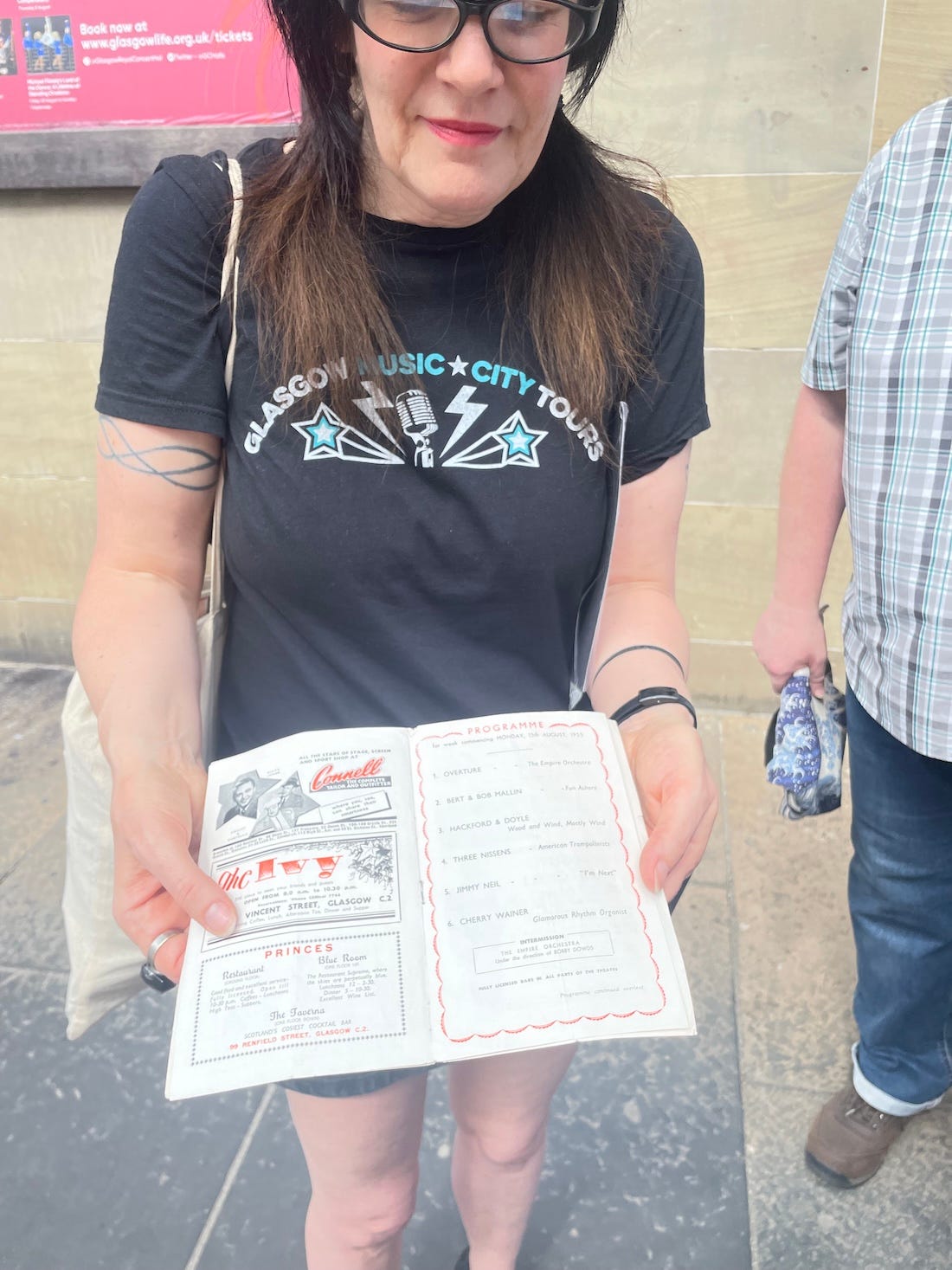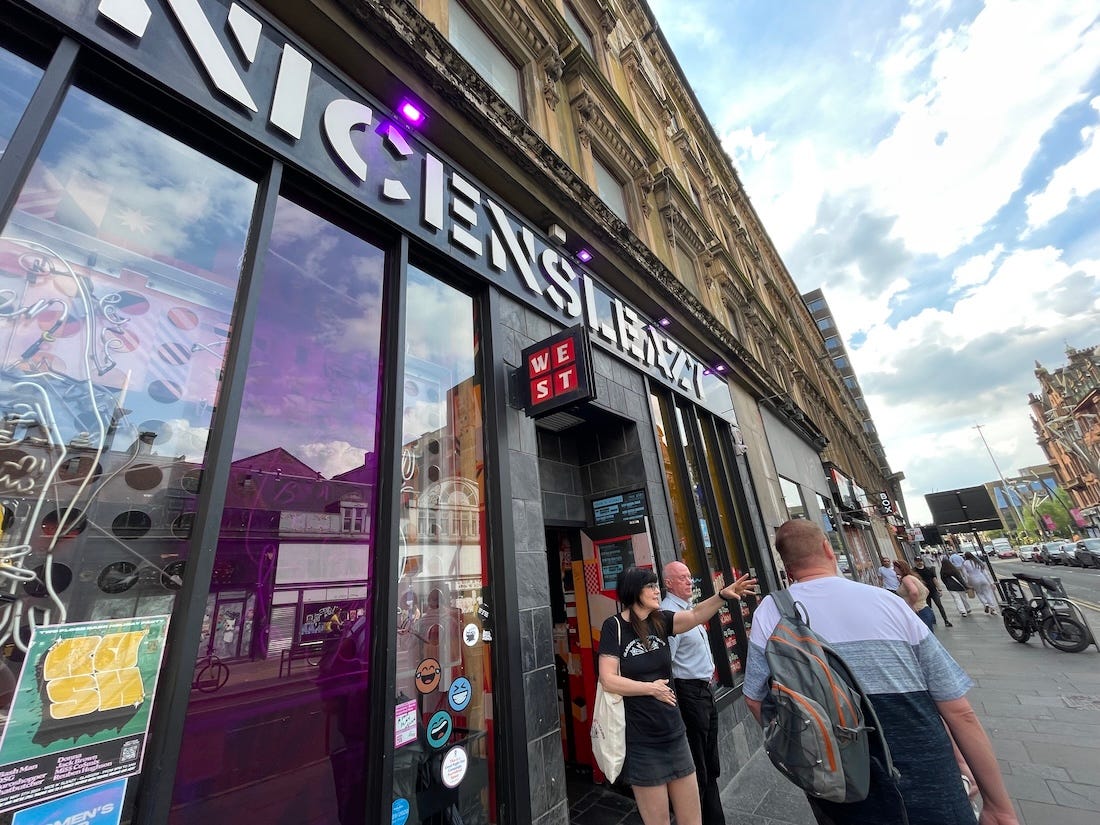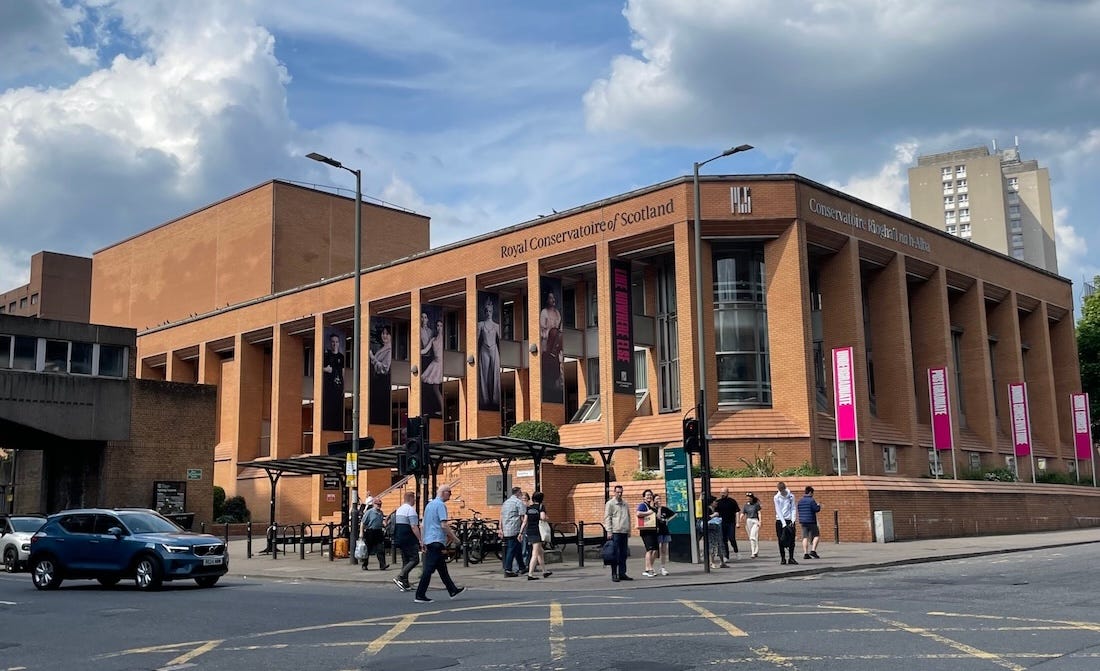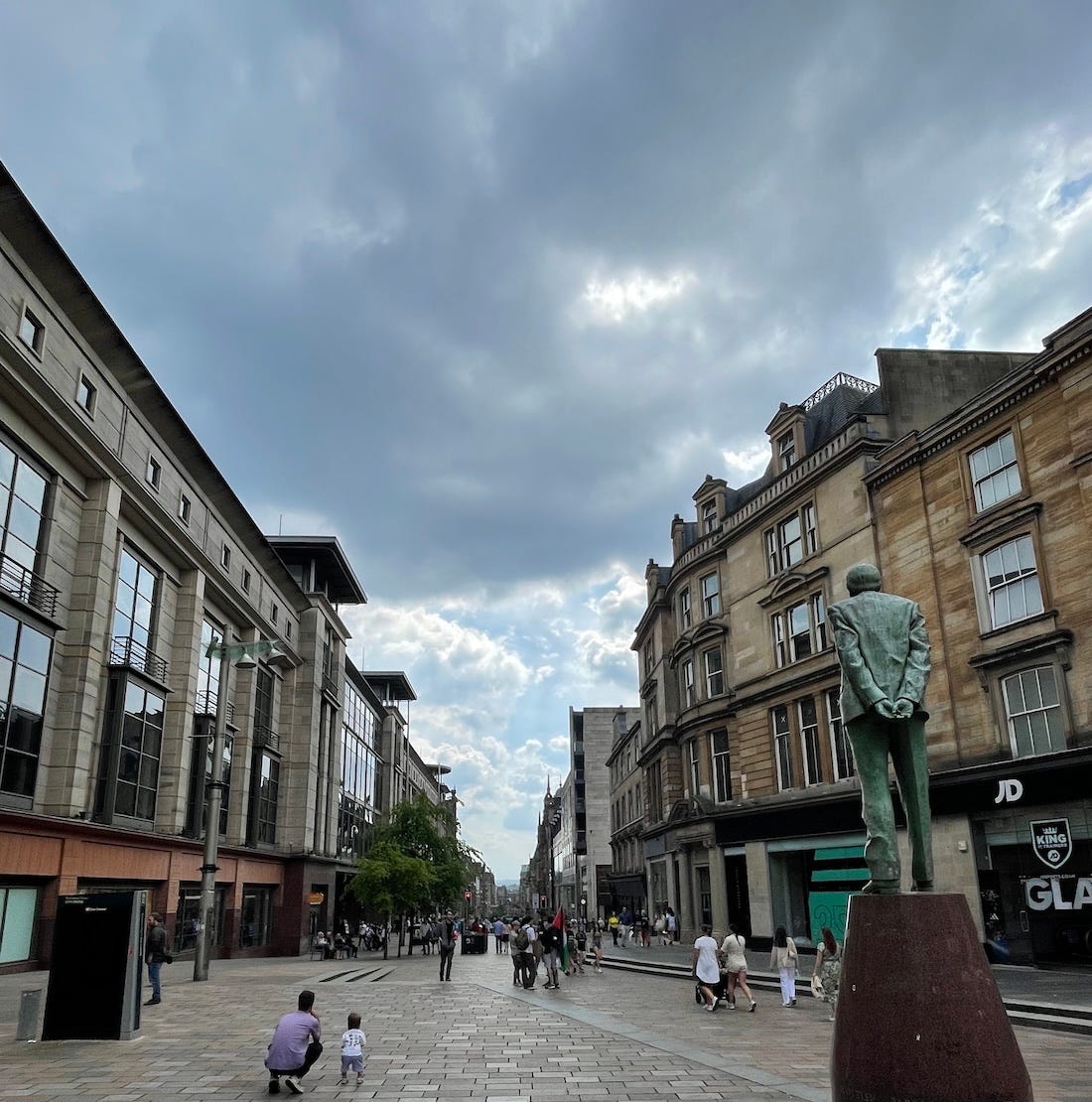Join Fiona Shepherd on a Glasgow Music City Tour
Hello my wonderfully loyal Streets of Your Town tribe!
In this week’s podcast episode, I’m hoping you’ll strap on your shoes and come for a walk with me through the musical backstreets of Glasgow!
Recently I spent a gloriously rare fine day in Glasgow for Streets of Your Town, wandering around the city’s renowned concert halls and gig venues with music journo legend Fiona Shepherd.
The co-founder and lead guide of Glasgow Music City Tours has been walking tourists around Glasgow’s live venues for more than a decade now, giving them a backstage glimpse of the city’s internationally renowned gigging live scene.
She says the tours grew organically from all the knowledge she’d gathered as a music journalist.
“Me and a couple of other friends, we thought it might be a way of using the knowledge that we had about the music scene,” Fiona says.
“Little did we know that when we started researching the tours that we didn’t know the half of it. So actually only a small amount of what we put in the tours was knowledge we had before we started researching.
“And then we started to learn more even about old venues we’ve never even heard of.
“And we also invite, as you’ve seen in the tour, we invite stories from our guests. So it’s a proper oral history of Glasgow’s music scene.”
Sitting down for a coldie with Fiona at the end of our musical walk through city streets, we pull up stumps at the celebrated Glasgow live venue King Tut’s Wah Wah Hut. She shares many stories from decades past right up to the present about the iconic performers who have come to the city to perform, or who made their big debut here, and the world famous bands who started performing on some of Glasgow’s more grungy stages.
“It’s the first rung of the touring ladder for bands. So essentially you’re going to start your career here,” she says.
“In King Tut’s, famously the stairs going up into the venue list all the artists that have played there over the years, and it is a who’s who of huge names. So you’re beginning the early years with people like Blur and Manic Street Preachers and Pulp and Radiohead, and then you’re moving up the stairs and you getting to people like Lewis Capaldi and some of the bigger names from more recent times that have emerged.
“So it would be unusual for a new band, certainly out of Glasgow, not to play King Tut’s at some point on their way up the ranks.”
Glasgow certainly punches above its musical weight for a smaller international city of around half a million people. Fiona has no doubt of where that spark of creativity comes from.
“I think if you’re talking about artistic endeavour, an element is that the weather is normally pretty bad here,” she says. “So if it’s going to rain a lot, you’re going to spend a lot of time indoors. If you’re spending time indoors, you can be rehearsing, writing songs, painting, sculpting, writing your new play, writing poetry. It’s quite conducive to the artistic lifestyle.
“I know that sounds like a bit of a cliché, but I do think that is probably part of it. I think if we had a nicer climate, we’d be more of a sporty city. But I think we’re quite an artistic city.
“There’s a lot of inspiration here. Glaswegians love language as well. We talk about the Glasgow patter—Glaswegians like to talk and I think if they like to talk, they like to express themselves. So they’re finding different ways to express themselves as well.
“We’re lucky with the different institutions we have. I do think the Conservatoire is crucial to Glasgow’s fertility as a music city and the Glasgow School of Art to a reputation as a city for visual arts. They talk about the Glasgow Miracle, and that is the number of artists that have emerged from the art school that have gone on to international careers and won the Turner Prize.
“We currently have, I would say, a small but really strong grassroots jazz scene. And again, that is down to musicians coming from the Conservatoire, but it’s about them plugging into the DIY culture.
“So that punk idea of make your own scene, so they’re not just within the walls of the Conservatoire learning their craft. They are out in the city making things happen.
“One of my favourite young jazz bands to come out of Glasgow are called Corto Alto, and they’re headed by the great young trombone player, Liam Shortall. Now they started their career basically filming performances in a flat on Sauchiehall Street.
“Young, talented musicians like Fergus McCreadie—he is a pianist coming through now. And he is the first jazz musician to win the Scottish album of the award. And for that same album, he was also nominated for the Mercury Music Prize—quite a prestigious UK wide prize. So there are people coming out and starting to make their name. The Glasgow Jazz Festival is my favourite festival in the city. It’s small, but it’s perfectly formed. I love it.”
We chatted about how Glasgow became so celebrated that it was one of the first three cities in the world to be given the title of UNESCO City of Music.
“I think one of the main reasons we were given that title was because of the vibrancy of the live music scene in the city,” she says.
“At the time they calculated that you could see on average 130 live music events in the city every week. So that’s from your biggest venues, stadium gigs, hydro arena venues, right down to pub sessions, 130 events per week. And I would think post lockdown, we must be back up at that number again.”
And one surprising aspect of the Glasgow music scene is the strong appreciation for country music.
“I put it down to the fact that country’s roots are in Scottish folk music, and Irish folk music,” she says.
“So if you think about Glasgow is an Atlantic facing port, so is Liverpool. There’s no coincidence there. So what happened was we shipped our music over to the States.
“And when it’s over there, it kind of percolates and becomes different things. It becomes bluegrass and then honkytonk, and then country music, and then of course they could sell it back to us. So I think it’s that recognition of the roots. We helped create this stuff in the first place.”
Even though Australia is about as far away from Glasgow as you can get, she hears that rich vein of musical influence clearly—going both ways across the seas. We pass an ACDC pinball machine on our way to the bar for another refresher.
“We gave you three of your greatest rock stars, in fact, more than that actually. I think Jimmy Barnes has a Glasgow connection. But I’m thinking of Bon Scott and Angus Young and Malcolm Young,” she says.
“Bon Scott’s not from Glasgow, so we can’t claim he’s from Glasgow, he’s from the east coast. But yeah, Angus and Malcolm Young were born in Glasgow, and their family immigrated to Australia as 10-pound poms. So when they came back to Glasgow in 1976 on the Lock up your Daughters tour, that was them returning to the city of their birth for the first time.
“I think the time when Jimmy Barnes would have been coming up, Glasgow was a really tough city. I’m not saying there’s not aspects of that now, any big city struggles, there’s parts of a city that are economically deprived. Glasgow still has that.”
Fiona wants to encourage all Aussies who are travelling in the UK to come to Glasgow and walk the streets with her for your own backstage glimpse of the city’s vibrant culture.
“Well, the weather’s contrasting, if you’ve had too much sun do come to Glasgow,” she says.
“I think scenery wise, Scotland’s amazing. What’s great about Glasgow is you are within half an hour, you’re out in amazing countryside, but you get to its best of both worlds because you get to enjoy a really vibrant city. I always say Glasgow is small enough not to feel lost in, but it’s big enough to support a lot of activity and a lot of stuff to do. There’s a lot of things to see and do, and obviously if you do come to Glasgow, please come out on a Glasgow Music City tour. We’d love to welcome you."







